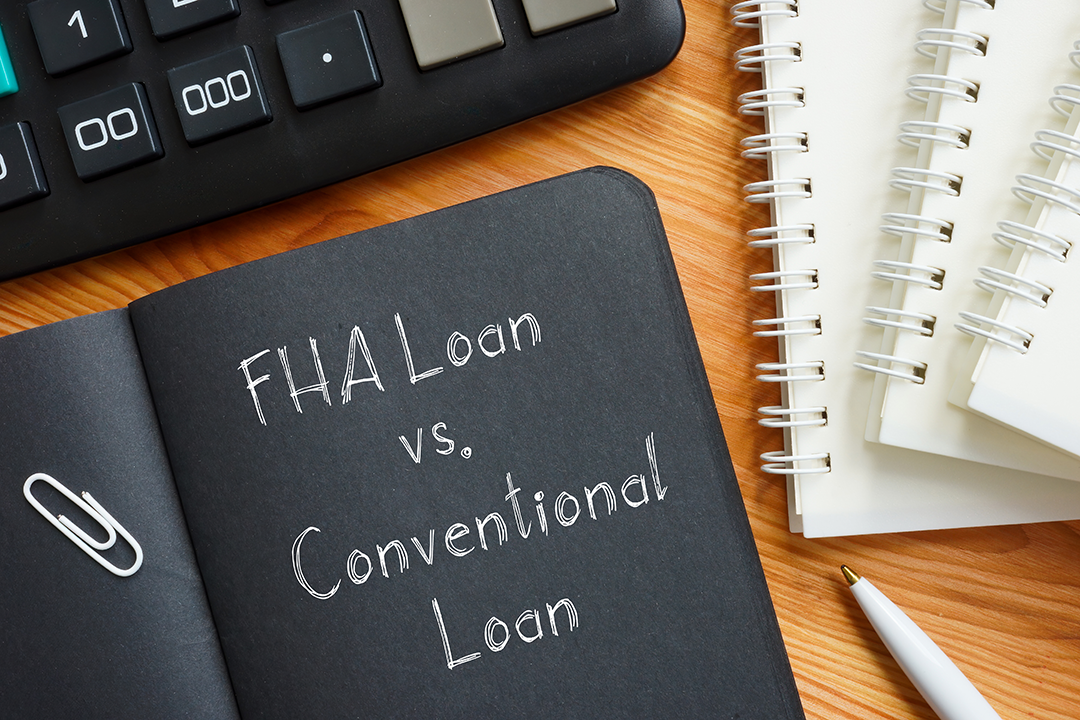Let’s talk about mortgages, specifically the key differences between Conventional vs FHA loans. If you’re beginning your home-buying journey, above all, congratulations! You are about to embark on one of the most extraordinary adventures of your entire life. A vast majority of borrowers begin this process with loan option questions. To illustrate the value of choosing the right mortgage option, purchasing a home is among the most significant decisions in life. In turn, homeownership plays an integral role in a household’s accumulation of wealth. For this reason, protecting your greatest asset is a priority for potential homeowners. In step with that, partnering with a loan officer with experience and a vast understanding of loans is a vital asset.
This broad overview of two of the most popular mortgage types will explain the differences and benefits of Conventional vs FHA loans. The high-level analysis is that FHA loans are for borrowers with lower-end credit and less secure finances, while conventional loans are for those with high credit scores and lower debt-to-income scores. Let’s talk about loans.
Conventional vs FHA Loans – When is FHA the best loan?
An FHA loan is a government-backed mortgage that the Federal Housing Administration insures. FHA loans offer two lender options: a bank or an FHA-approved lender. FHA loans are very popular among first-time homebuyers for several reasons. Borrowers often choose an FHA vs. conventional loan since upfront out-of-pocket requirements are low, and credit scores are less demanding. In many cases, FHA loans provide opportunities for the younger community to purchase their first single-family home.
Can a borrower put less than 20% down? Yes. Traditionally, FHA loans require a lower minimum down payment and are more lenient on credit score requirements. Those with good credit can get into an FHA loan type with a down payment amount as low as 3.5%. Borrowers with higher credit scores need less money upfront. Subsequently, taking advantage of the low down payment requirements for FHA loans is enticing; however, remember that you will be paying an inflated insurance rate to compensate for a government agency backing your loan.
When comparing conventional vs FHA Loans, mortgage insurance is a significant factor.
FHA loan programs require mortgage insurance even if buyers exceed the minimum down payment requirement. Here is the basic breakdown.
(UFMIP) is an Upfront Mortgage Insurance Premium. This one-time payment, which can be rolled into the loan, is 1.75% of the loan total.
(MIP) is an annual mortgage insurance premium and payments are based on the loan balance and payoff terms remaining. In essence, MIP payments last for the life of an FHA loan unless you put 10% or more down. If you put more than 10% down, your MIP will end in 11 years.
Down Payment Ratios with Conventional vs FHA Loans
At its core, mortgage insurance protects the lender if you stop paying for your home and become a foreclosure risk. Understandably, buyers often confuse these premiums with PMI, private mortgage insurance, typically seen in conventional loans. To fully understand PMI, we must first define LTV. The loan-to-value ratio is how much you borrow compared to the home’s value. Many buyers make a 20% down payment and never have to pay PMI.
Once your LTV drops below 78%, you will no longer pay PMI. Typically, with FHA mortgage premiums, you will essentially pay two mortgage insurance premiums. You will pay the upfront mortgage insurance premium at closing and the other in your monthly mortgage payment.
FHA loans provide an excellent opportunity for younger borrowers, those with smaller down payments, and those with higher debt-to-income ratios. Accordingly, FHA loans offer fixed-rate and adjustable-rate mortgage (ARM) financing options to help buyers get into their dream homes by leveraging interest.
Qualifying factors for an FHA loan:
- 2-year work history and proof of employment
- Debt to income maximum (DTI ratio) 55%
- Higher down payments
- A credit score (FICO) of 580 or higher for a 3.5% down payment
- A credit score (FICO) between 500 and 579 requires a 10% down payment
- MIP payments
- The home must be the borrower’s primary residence
- Strict property standards
- The FHA loan limit (2023) is $472,030
What is a conventional loan?
Conventional loans or loans not guaranteed by any government program or agency. This type of loan rewards buyers for their patience, creditworthiness, and larger down payments. Each mortgage lender offers different loan types, terms, and fees, and the paperwork is more detailed. For this reason, it is imperative to do your research, find a mortgage broker you trust, and educate yourself on your options.
The benefit of choosing conventional vs. FHA loans is that buyers have more flexibility on loan amounts and property conditions and lower long-term financing costs. Once the loan process is complete, the lender will place a mortgage lien on the property. This will secure the asset for them in case you stop making payments. Lenders assume less risk with conventional loans vs FHA loans considering the vetting process for loan approval.
Conventional loans help provide stability and liquidity in the secondary mortgage market. In the secondary mortgage market, lenders often sell loan portfolios to private investors or government-backed institutions, freeing up their capital to issue more loans. These practices help to keep the market competitive and provide funds for Americans to purchase homes.
Conventional vs FHA Loans – Property Selection is Essential
There are two types of conventional loans: conforming and non-conforming. Many conventional loans are conforming loans. A conforming loan is a mortgage that must adhere to Freddie Mac and Fannie Mae’s standards and guidelines. Chiefly, these guidelines ensure a property meets the gold standards of safety and structure. Ultimately, government-sponsored enterprises of Freddie Mac and Fannie Mae purchase many conventional loans. The benefit is that because the government secures the loan, the original lender receives a prompt payout and does not have to wait thirty years to receive money for the loan.
Secondly, there are non-conforming loans. These do not conform to the Fannie Mae and Freddie Mac guidelines. Lenders with these types of loans must keep them for longer periods. You can expect higher interest rates, and the borrower will need higher credit scores since these loans come at a higher risk to the lender. Additionally, they sell these loans in the open market to investors. Due to their competitive environment and borrower risk, they require fewer property regulations. Non-conforming loans often facilitate house flipping and investments.
Some conventional loans are non-conforming, such as VA loans for active military. These loans allow veterans to finance a conventional mortgage with no down payment, no mortgage insurance, and lenient credit requirements. The second example is jumbo loans. These mortgages exceed the lending limits set by FHFA for conventional mortgages.
The bottom line with a conventional loan is that you can streamline the home-buying process and move in quickly if you have excellent credit, a low debt-to-income ratio, and a 20% down payment. Conventional loans work well for purchasing a second home, an investment property, or a vacation home.
Qualifying factors for a Conventional loan:
- 2 years employment history
- 620 minimum credit score
- Down payment of 5%+ (3% for 1st-time homebuyers)
- Debt to income maximum of 45%
- Liberal property standards
- If your debt to income is 45%-49,% a larger down payment can be made.
Now that you understand the differences between Conventional vs FHA loans, let’s talk about the next steps.
Like any big adventure, it all starts with a dream, and attention to detail is the key to perfection. Preparing for home buying is no different. In light of this, paying close attention to monthly income and savings is vital to homeownership success. Loan approval reaches beyond affordability since loan approvals hinge on financial integrity. Therefore paying down credit cards and practicing financial restraint is a significant step in preparedness. Subsequently, less debt and monthly out-of-pocket expenses naturally increase savings for down payment and closing cost funds.
A good loan officer will guide buyers through every step. Reaching beyond the initial sale, experienced lenders ensure educated decisions continue throughout the life of the loan. Talk to them often, and enlist their help in deciding your maximum purchase price and monthly payment. Choosing conventional vs FHA Loans is an easy decision with a mortgage advisor on board. These professionals are ready and willing to assist you even in the infancy of your journey to streamline your financial situation and get you a favorable loan term. Professional guidance will help you know when mortgage rates are optimal and which mortgage loan is right for you.
Mortgage Insiders can help you decide between Conventional vs FHA Loans.
Your home plays a major role in financial security. So, regarding your mortgage loan, you want to be sure you’re making responsible decisions. Undoubtedly, the loan process invokes insecurity in many people. In particular, navigating through a sea of paperwork and financial jargon can be unsettling without honest guidance. In fact, a lack of clarity can lead you down the wrong path and compromise your financial future.
Mortgage Insiders have helped thousands of families reach their goals to create stronger financial futures. You deserve to work with a lender who brings clarity and has your best interest at heart. Whether you’re looking to purchase a home, help with refinancing, lower interest rates, or specifically ensure that you have made the best decision for the life of your loan.
Three Simple Steps:
- Schedule a Call: An experienced loan officer can discuss your needs and guide you through the possibilities.
- Get Approved: We’ll help you through the application process and facilitate the steps for approval.
- Exhale: Put your feet up and feel secure knowing you made the best decisions about your home loan.
With proper guidance, you can get your first home, accommodate your growing family, and start that renovation project—whatever goal is on the horizon. An alliance with Mortgage Insiders will give you the confidence to know that your mortgage loan is setting you up for financial success. Mortgage Insiders offers today’s latest financial news and mortgage trends. Check out the Mortgage Insiders channel for current events.





